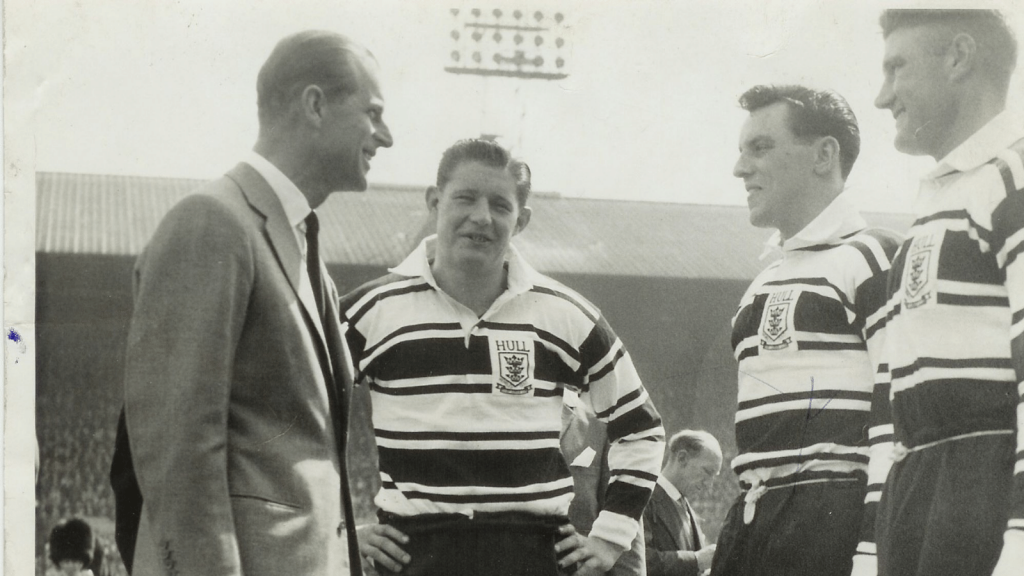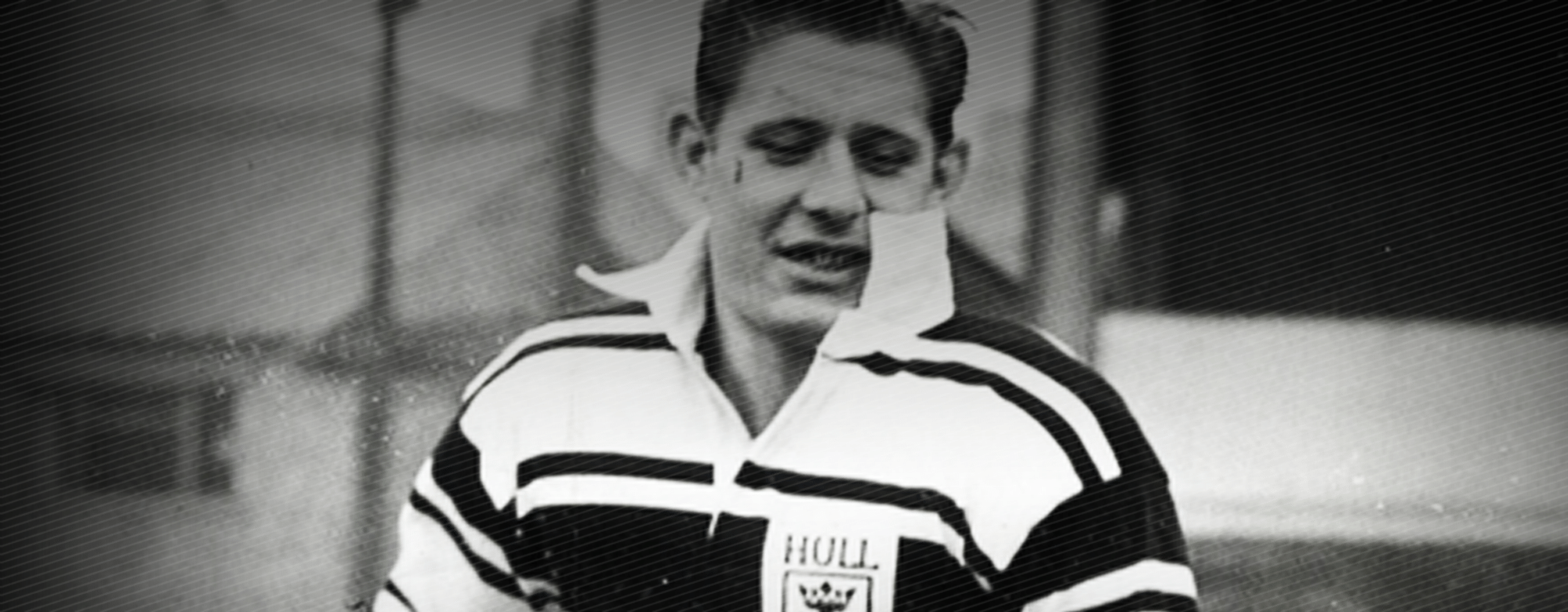Following the news of his passing at the age of 91 earlier today, Hull FC looks back on the life and career of their greatest ever player, Johnny Whiteley MBE.
Widely regarded as the greatest Rugby League player to ever come out of the city of Hull, Johnny gave over seventy years of service to his beloved Black & Whites, and the wider sport, having made an incredible 418 appearances for the club, before coaching the side in later years, and leaving a lasting legacy as one of the sport’s greatest ambassadors post-retirement.
Having grown up in West Hull in the 1930s and 40s, and famously surviving the Hull Blitz despite a direct hit which devastated his Scarborough Street home, Whiteley was a filliter by trade on Hull’s thriving fish docks, before signing for Hull from the Hull Boys Club in December 1950 after completing his National Service in the army.
The team at Hull Boys Club had a pact under which no-one would sign professional until they had served their conscription, and most of John’s team mates did so, mainly with Hull and Hull KR.
John impressed in two trials in the A team before being called up in the loose-forward berth for his senior debut at Clarence Street, York on 23rd December 1950 – a game which Hull won 19-11, with 20-year old Whiteley making an impressive start to life as a Black & White.
A couple of days later, he had his first encounter with cross-city rivals Hull KR in the traditional Christmas Day Hull Derby. His opposite number that day was Alec Dockar, himself an England international.
The programme notes for that derby game stated that “he had certainly impressed in the two trials and that club officials had great hopes that John would make a name for himself”. John played 14 games in that first season, only missing out for a month in February-March due to injury.
He impressed in his initial seasons with Hull, sufficiently so to earn selection for Yorkshire in the County Championship encounter with Cumberland at Workington on 29th September 1952 in the second-row. He retained his place, this time at loose-forward for the Boulevard encounter with Lancashire, in which Mick Scott and Harry Markham also featured.
In all, John would feature for Yorkshire on some twelve occasions. International recognition also came early when he played for England U23s at Wigan. Full England honours followed in April 1953 against France in Paris. The 1953-54 season saw him help Yorkshire to the County Championship in a play-off at Whitehaven alongside Mick Scott, Bill Riches and Keith Bowman.
That season also saw Hull reach the first of three successive Yorkshire Cup Finals, all of which John played in. By this period, Whiteley was revered throughout the game for his ball handling skills, the like of which are rarely seen in today’s game, and his ability to put his supporting half backs through the gaps he created. Tommy Finn scored 132 tries for Hull and Rowley Moat created a new tries record for a stand-off in the 1955-56 season, by being on hand to benefit from Johnny’s skills. And dozens of Ivor Watt’s 216 tries came from Johnny’s famous ‘scissor pass’.

The first Rugby League World Cup was held in France in the Autumn of 1954 and John was selected in the 18-strong party under the captaincy of Huddersfield’s Dave Valentine.. At this stage, it has to be appreciated that there were some class loose-forwards such as Wigan’s Harry Street, Bradford’s Ken Traill, and Valentine himself, so John was biding his time for full Great Britain selection.
Although he was fated not to play in the tournament, his Hull FC friend Bob Coverdale played in all four matches as Great Britain – perhaps unexpectedly – won the tournament. John went on to selection in all of the first three British World Cup squads (1954, 1957 and 1960), a distinction shared only with Mick Sullivan.
Hull, led by Mick Scott, won the Rugby League Championship in 1955-56 with Johnny having his most outstanding season so far. Nevertheless, it was a surprise that he was overlooked for the Lions Tour to Australasia that summer.
He was however on the plane Down Under in the summer of 1957 for the ill-fated World Cup tournament that celebrated the 50th Anniversary of the Australian Rugby League and he made his test debut in the encounter with Australia at the Sydney Cricket Ground.
He gained selection for a Rest of the World team to play the cup-winning Kangaroos. His subsequent 15 GB Lion’s appearances were all the more credible as there was another generation of good back-rowers coming to the fore.
Another Championship success came Hull’s way in 1957-58, this time with John as captain of a team that possessed an all Hull-born pack of forwards in the Championship Final. He and Tommy Harris left immediately after that final to join up with the Lions on the 1958 Australasian Tour. The back row of Dick Huddart, John Whiteley and Vince Karalius was the finest such combination in the history of the game.
The game’s folklore has the 2nd test victory at Brisbane as Great Britain’s finest hour as they claimed the Ashes Down Under. The following year, Johnny scored a vital match-winning try at Headingley to win the Ashes series against Australia. That was the last occasion the British won the Ashes on home soil.
At club level, under John’s captaincy, Hull reached Wembley for the first time in their history in 1959 and 1960. Cup final luck deserted them though, particularly so in the latter year when prior injuries devastated the selection.
After no less than 418 appearances in the Black and White of Hull FC, in which he scored 156 tries, Johnny retired from playing in 1965. Having taken on the position of player-coach a couple of years previously, he undertook the sole role for a further five years during which he guided the team to Yorkshire Cup Finals in 1967 and 1969, the latter being the first success in that competition since 1923. In tandem with the position at Hull, he coached the Yorkshire County team for 12 years, and succeeded to the Great Britain coaching position, leading them to the 1970 Ashes triumph in Australia, the last time that Great Britain ever won the Rugby League Ashes.
Upon his return from Australia in August 1970, it was announced that John had left Hull and taken up the coaching position at Hull KR. He guided the Robins to a Yorkshire Cup success in 1971 before leaving Craven Park.
He returned to the Boulevard assisting with coaching and in 1992 was inducted into the inaugural Hull FC Hall of Fame. He has since also been enrolled onto the Rugby League Roll of Honour, received the MBE in 2006, and subsequently made a Freeman of the City of Hull. He was finally inducted into the Rugby League Hall of Fame on 7th November 2018.
In retirement, Johnny took on an ambassadorial role for the club and the wider sport too; he was a trustee of the Hull FC Community Foundation and regularly took part in sessions, including their Old Faithful dimension sessions, recounting stories and memories with older supporters across the region.
Johnny’s personal mantra, as everyone who knew him knows, was to be the best version of yourself that you can possibly be. Johnny wanted to play for Hull, then wanted to captain Hull, and then coach them too. He achieved all of them, and so much more, including his incredible success on the international stage.
The club sends its deepest condolences to Johnny’s family and friends, they are in our hearts and minds at this incredibly sad time.
Rest in peace, Johnny.
The club has opened a book of condolence for supporters to leave their tributes to Johnny – the book is available to sign at the club’s St Stephen’s retail store during normal opening hours.
With thanks to Club Historian, Bill Dalton.















